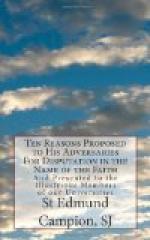THIRD REASON
THE NATURE OF THE CHURCH
At hearing the name of the Church the enemy has turned pale. Still he has devised some explanation which I wish you to notice, that you may observe the ruinous and poverty-stricken estate of falsehood. He was well aware that in the Scriptures, as well of Prophets as of Apostles, everywhere there is made honourable mention of the Church: that it is called the holy city, the fruitful vine, the high mountain, the straight way, the only dove, the kingdom of heaven, the spouse and body of Christ, the ground of truth, the multitude to whom the Spirit has been promised and into whom He breathes all truths that make for salvation; her on whom, taken as a whole, the devil’s jaws are never to inflict a deadly bite; her against whom whoever rebels, however much he preach Christ with his mouth, has no more hold on Christ than the publican or the heathen. Such a loud pronouncement he dared not gainsay; he would not seem rebellious against a Church of which the Scriptures make such frequent mention: so he cunningly kept the name, while by his definition he utterly abolished the thing, He has depicted the Church with such properties as altogether hide her away, and leave her open to the secret gaze of a very few men, as though she were removed from the senses, like a Platonic Idea. They only could discern her, who by a singular inspiration had got the faculty of grasping with their intelligence this aerial body, and with keen eye regarding the members of such a company.
What has become of candour and straightforwardness? What Scripture texts or Scripture meanings or authorities of Fathers thus portray the Church? There are letters of Christ to the Asiatic Churches (Apoc. i. 3), letters of Peter, Paul, John, and others to various Churches; frequent mention in the Acts of the Apostles of the origin and spread of Churches. What of these Churches? Were they visible to God alone and holy men, or to Christians of every rank and degree?




